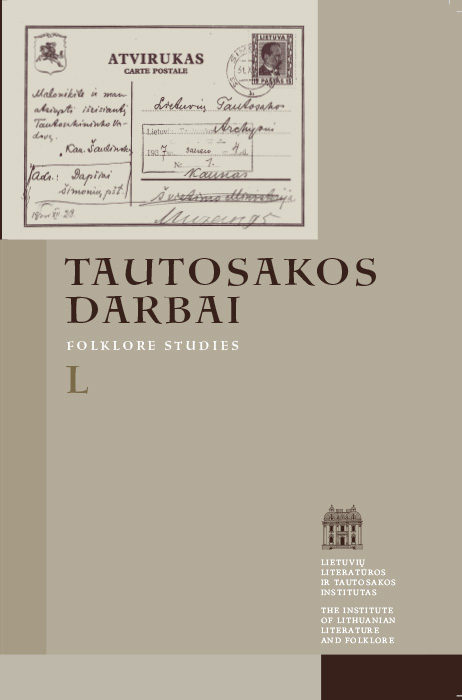Folkloristics in the Independent Lithuania (1918–1940): Outlining the History
Abstract
The Soviet occupation starting after the WWII determined the direction of folklore research in Lithuania for decades, not only taking away the possibility of continuing the folklore studies launched already in the independent interwar Lithuania, but even that of appreciating the ideologically untainted history of folkloristics from that period. The 80th anniversary of the Lithuanian folklore archives that is celebrated this year encouraged us turning back and revisiting this span in the history of the Lithuanian folkloristics, which at the time was just acquiring the shape of an independent scholarly discipline. Based on various documents scattered in different archives and repositories and on the relevant publications in periodicals of the time in question, the author of the article discusses the cultural, academic and political situation of establishing the first centralized folklore institutions (the Folklore Commission, the Commission for Gathering Folk Melodies, and the Lithuanian Folklore Archives). The author also analyzes the tasks that these institutions had to fulfill as well as the ways in which the representatives of different schools of folklore research dealt with these tasks.
An important prerequisite for establishing a folklore research center in the independent Lithuania was founding of the Lithuanian University, which joined humanitarians willing and ready to organize the research activities, and raising various issues related to the investigations of the national culture, its dissemination and collection in view of the future research. Therefore, it is hardly accidental that in 1930 the Folklore Commission was established at the Faculty of Humanities. It was the first official institution in charge of folklore: collection of the Lithuanian folklore and preparing for its systematization. As many other commissions of the time, it also launched publication of series entitled Mūsų tautosaka [‘Our Folklore’] – the first research journal in folklore, which published numerous collections, ethnographic descriptions of daily life and customs, and research articles. However, due to the lack of a broader understanding of folklore and in absence of educated folklore specialists, folklore was primarily regarded as a source material for literature and science, while research was frequently overshadowed in the Commission’s activities by folklore popularization.
Nevertheless, in the course of the 1930s significant changes took place in the Ministry of Education and in the cultural policy that it implemented. These changes affected folkloristics as well. In 1934, Juozas Tonkūnas was appointed as the new Minister of Education. Having his background in the academia, he radically changed the direction of the national culture policy, attempting finally to bring the abstract rhetoric concerning the rather obscure “national culture” onto a solid basis. Such basis, according to him, could only be established as a result of the scholarly research, and more precisely – studies of Lithuanian language, literature, history, and folklore. It is also important, that academic community had matured by that time and was ready for the changes to take place. In the 1930s, the University of Vytautas Magnus introduced a separate course in Lithuanian folklore, while in 1934 a Chair in Ethnics was finally established. Having completed their studies at the Western universities and acquiring basic learning in folkloristics, young specialists started coming back, bringing together Western cultural ideas and research experiences.
The above-mentioned reasons (insufficient scientific activities of the Folklore Commission, appearance of young specialists educated in folklore and general changes in cultural policy) could have prompted the Ministry of Education to terminate the activities of the Folklore Commission, establishing instead a new scholarly institution subordinated directly to the Ministry. Thus, the Lithuanian Folklore Archives was established in 1935, which until nowadays preserves its central position as the most important folklore repository, storing centuries-old collections regarded as important documents of Lithuanian folklore, national culture and history, as well as continuing to accumulate the most recent fieldwork data. The sphere of the activities of the Folklore Archives was defined in July 6, 1935 by the special law; it included collection, systematization, publishing and preservation of the (verbal) folklore and folk melodies. Jonas Balys, a professional folklorist educated at the Western European universities and therefore preferring the Western pattern of dealing with folklore, was appointed director of the newly established Folklore Archives. As diverse scholarly and applied activities of the Lithuanian Folklore Archives clearly testify, the Lithuanian folkloristics in the 1930s was already making its first, but rather sure steps in the academic field of folklore research, concentrating on collection, preservation and analysis of the oral cultural heritage.
Downloads
Most read articles by the same author(s)
- Vilma Daugirdaitė, Editorial Board and Table of Contents , Tautosakos darbai: Vol. 65 (2023): Tautosakos darbai
- Vilma Daugirdaitė, Author guidelines and Bibliographic Data , Tautosakos darbai: Vol. 65 (2023): Tautosakos darbai
- Vilma Daugirdaitė, Rūta Pleskačiauskienė, Ambraziejus Jonynas: the Bibliographic Index, 1937–2019 , Tautosakos darbai: Vol. 63 (2022)
- Vilma Daugirdaitė, “Since Then, People Started Thinking about This Mountain in a Different Way”. From Jonas Kumetis’ Memories about the Veliuona Hillforts , Tautosakos darbai: Vol. 64 (2022)
- Vilma Daugirdaitė, The Lopaičiai Landscape from the Historical and Modern Perspective , Tautosakos darbai: Vol. 47 (2014)
- Vilma Daugirdaitė, Editorial Board and Table of Contents , Tautosakos darbai: Vol. 66 (2023): Tautosakos darbai
- Vilma Daugirdaitė, Aukusti Robert Niemi and His Collection of Folklore from Southern Lithuania Revisited. Textological Approach , Tautosakos darbai: Vol. 55 (2018)
- Vilma Daugirdaitė, Past and Present of Lopaičiai as Viewed by the Local People , Tautosakos darbai: Vol. 47 (2014)
- Vilma Daugirdaitė, Editorial Board and Table of Contents , Tautosakos darbai: Vol. 67 (2024): Tautosakos darbai
- Vilma Daugirdaitė, Full bibliography of Tautosakos darbai / Folklore studies: 1935 – 2015 (Vols. 1 – 50) , Tautosakos darbai: Vol. 50 (2015)




